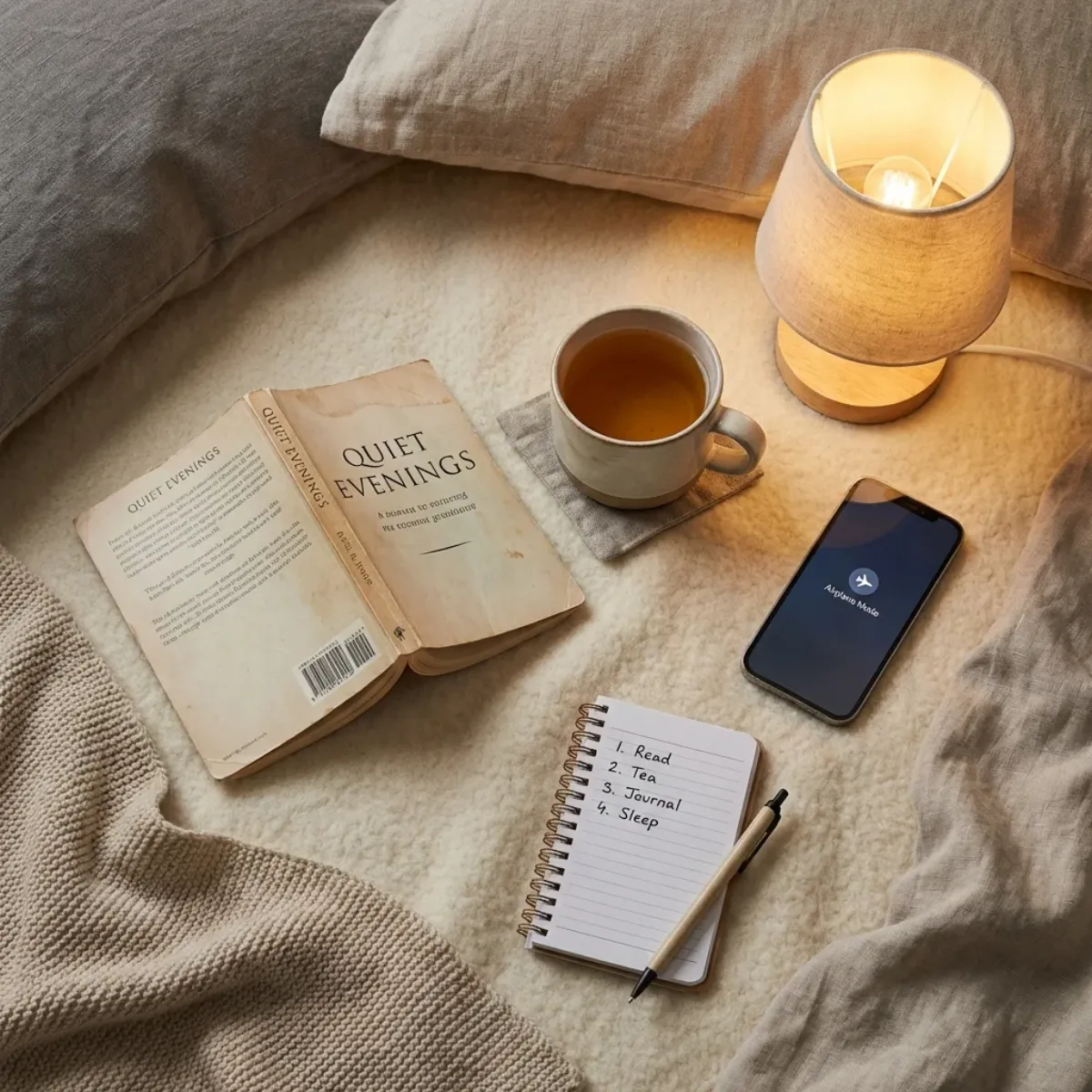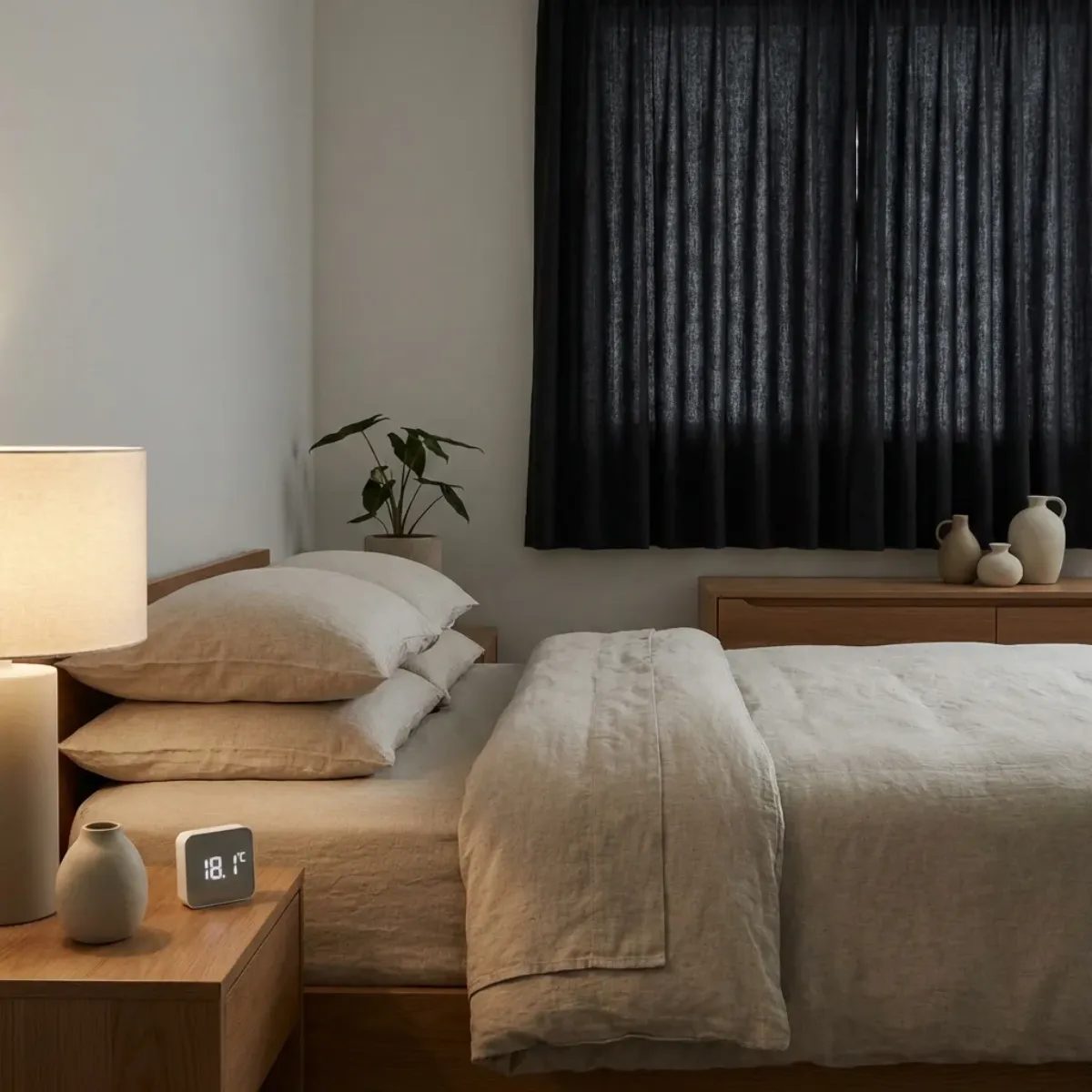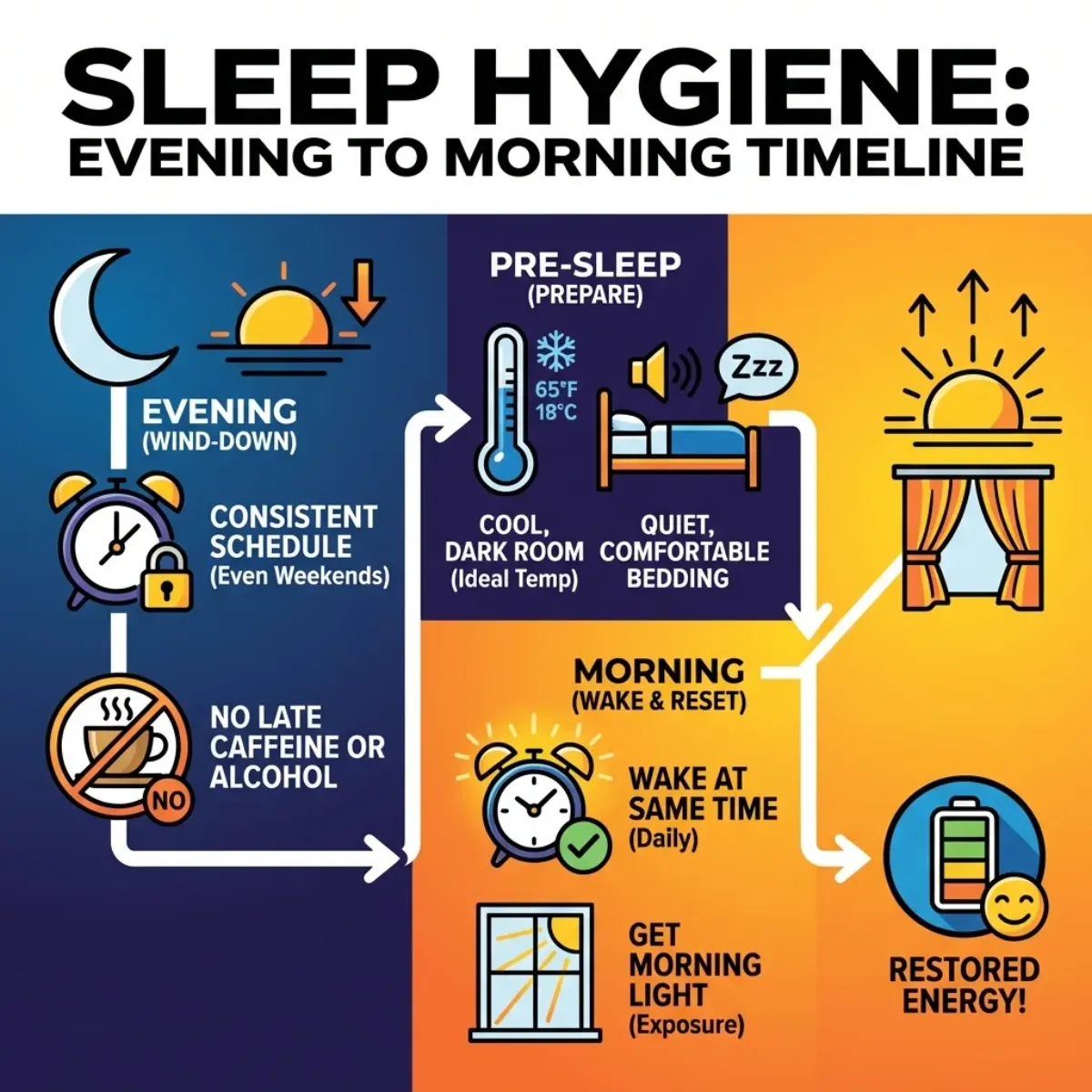10 Simple Tips to Improve Your Sleep: Ultimate Guide
Why does better sleep change almost every health metric?
Sleep is not just downtime. It is an active biological process that regulates hormones, metabolism, immune signaling, memory consolidation, emotional processing, and tissue repair. When sleep gets fragmented or too short, these systems do not fail all at once. They drift off target in small ways that add up: energy becomes less stable, appetite cues become louder, stress reactivity increases, and focus becomes less reliable.
Population guidance from the Centers for Disease Control and Prevention and sleep risk summaries from the National Heart, Lung, and Blood Institute consistently show the same pattern: routine sleep restriction is associated with worse cardiometabolic outcomes, lower resilience to stress, and a higher burden of daily symptoms. You do not need to be fully sleep deprived for those effects to appear. Even partial sleep loss repeated across a week can shift daytime functioning.
That is why better sleep usually improves more than one symptom at once. People often start with one goal, like falling asleep faster, then notice secondary gains: fewer afternoon cravings, better patience, cleaner thinking, and less nighttime rumination. If you have tried random tips before without lasting results, the missing piece is usually a system. The goal is to align your schedule, environment, light exposure, and stress regulation so each habit supports the others.
Quick fact: Sleep quality is often more trainable than people assume. Small, repeatable behaviors done at the same time each day produce stronger results than occasional extreme changes.
Before diving into the details, here is a practical map of ten evidence-informed actions. You can start with two or three tonight, then layer the rest over the next week.
| Tip | Why it helps | First action tonight |
|---|---|---|
| 1. Keep a fixed sleep window | Stabilizes circadian timing and sleep pressure | Set one wake time you can keep all week |
| 2. Build a wind-down ritual | Reduces cognitive and physiological arousal | Schedule a 60-minute low-stimulation routine |
| 3. Cool, dark, quiet bedroom | Decreases awakenings and improves sleep depth | Lower room temperature and block light leaks |
| 4. Morning light exposure | Anchors circadian rhythm and evening melatonin timing | Get outside within one hour of waking |
| 5. Time caffeine and alcohol | Prevents stimulant carryover and sleep fragmentation | Set a caffeine cutoff at least 8 hours before bed |
| 6. Adjust evening meals | Limits reflux, glucose swings, and discomfort at night | Finish large meals 3 hours before bedtime |
| 7. Stress downshift tools | Interrupts rumination and hyperarousal | Use slow breathing for 5 minutes before bed |
| 8. Strategic naps only | Prevents nap-driven bedtime delay | Keep naps under 30 minutes before mid-afternoon |
| 9. Weekend consistency | Avoids social jet lag and Monday sleep disruption | Keep wake time within 60-90 minutes of weekday |
| 10. Plan for setbacks | Builds adherence and prevents all-or-nothing cycles | Choose one backup bedtime routine for stressful days |
Tip 1: Keep a consistent sleep window
If you only change one variable, change timing consistency. Going to bed and waking up at wildly different hours forces your internal clock to constantly re-adjust. People often focus on bedtime alone, but wake time is the stronger anchor. Pick a wake time that works for weekdays and keep it within the same narrow range on weekends.
A practical target is a 7.5 to 8.5 hour sleep opportunity window. For example, if your fixed wake time is 6:30 a.m., a 10:15 to 10:45 p.m. lights-out range gives your body predictable structure. Expect the first week to feel imperfect. Circadian systems usually adapt over repeated exposures, not overnight.
If your current schedule is far off, move bedtime gradually by 15-30 minutes every few nights while keeping wake time stable. This avoids the frustration of lying awake for long periods. If you want another baseline framework, this related guide on best ways to improve your sleep complements the consistency strategy with additional routines.
Track only three markers for seven days: how long it takes to fall asleep, number of awakenings, and daytime sleepiness level. This simple feedback loop helps you see progress before perfection and keeps motivation tied to measurable changes.
Tip 2: Build a wind-down ritual that lowers arousal
Many people say, "I am physically tired but mentally wired." That usually means arousal is the bottleneck, not lack of fatigue. A wind-down ritual works by reducing cognitive input and sympathetic activation in the hour before bed. Think of it as a transition protocol, not a single trick.
Your 60-minute wind-down can be simple: dim lights, stop work and emotionally charged conversations, switch to low-stimulation activities, and keep your phone outside arm's reach. If racing thoughts are the main issue, use a paper "brain dump" list of unfinished tasks so your mind does not keep rehearsing them in bed.
Evidence-based insomnia care frequently includes behavioral approaches such as stimulus control and cognitive strategies; a broad synthesis is available on PubMed. You can also layer body-based calming tools like paced breathing and guided meditation. If you need step-by-step techniques, these internal resources are useful: breathing techniques for stress relief and meditation techniques and benefits.
Keep the ritual identical for at least five nights before judging it. Repetition is what teaches your nervous system that sleep is approaching. Variety can feel interesting, but consistency is what conditions faster sleep onset.

Tip 3: Design a bedroom your brain associates with sleep
Your sleep environment should reduce micro-awakenings. The most common misses are room temperature that is too warm, light exposure from devices and street sources, and intermittent noise. The fix is not expensive gear first; it is controlling the highest-impact variables in order.
Light is especially important because evening exposure can suppress or delay melatonin timing. Controlled laboratory evidence on evening light and melatonin is summarized in this PubMed-cataloged study. In practice, dim household lighting 1-2 hours before bed and avoid bright overhead fixtures late at night.
Start with this target table and adjust one variable at a time. Changing everything at once makes it hard to identify what actually improved your sleep.
| Environment variable | Target range | Low-cost adjustment |
|---|---|---|
| Room temperature | About 60-67°F (15.5-19.5°C) | Lower thermostat, lighter bedding layers |
| Light exposure | Near-dark sleeping environment | Blackout curtains, cover device LEDs |
| Noise | Steady low background or quiet | Fan or white noise source |
| Mattress/pillow support | Neutral spine comfort | Replace flattened pillow, rotate mattress |
| Air quality | Clean, non-stuffy airflow | Ventilate room before bedtime |
Use your bedroom for sleep and intimacy only when possible. Doing work, scrolling social feeds, or watching stressful content in bed trains your brain to associate the room with wakefulness. If you cannot sleep after roughly 20 minutes, get up briefly, do a quiet activity in dim light, and return when sleepy.

Tip 4: Train your body clock with light and movement
Morning light is one of the strongest circadian signals available without medication. When bright natural light reaches your eyes early in the day, it helps anchor alertness in the morning and sleepiness at night. Aim for 10-30 minutes outdoors in the first hour after waking when possible.
Daytime movement is the second anchor. A meta-analytic review indexed on PubMed found that regular exercise is associated with better sleep quality, especially when it is performed consistently across the week. You do not need intense workouts to benefit. Brisk walking, light strength work, or cycling can all help if done regularly.
For people who feel mentally overloaded, pairing movement with nature can reduce stress carryover into the evening. This internal read on awe walks for mental well-being is a practical option if you need a low-friction habit.
Try this sequence: daylight soon after waking, movement during the day, dimmer light at night. These signals reinforce each other and make bedtime sleepiness feel more natural instead of forced.

Tip 5: Time caffeine, alcohol, and meals with intention
Caffeine blocks adenosine signaling, which can delay sleep onset and reduce sleep depth when consumed too late. In a controlled trial listed on PubMed, caffeine taken even six hours before bedtime significantly reduced sleep time. Many people are sensitive beyond that window, especially with larger doses or slower caffeine metabolism.
Alcohol can make people sleepy at first but tends to fragment sleep later in the night, increasing awakenings and reducing restorative architecture. Heavy or late meals may also worsen reflux and nighttime discomfort. The pattern to remember is simple: what feels relaxing in the evening can still harm sleep continuity later.
Use the cutoff table below for one week and adjust based on your results.
| Input | Recommended cutoff | Reason |
|---|---|---|
| Coffee, energy drinks, high-caffeine tea | 8+ hours before bedtime | Reduces stimulant carryover into sleep window |
| Alcohol | 3-4+ hours before bedtime | Lowers risk of fragmented second-half sleep |
| Large meals | 3 hours before bedtime | Limits reflux and digestive discomfort |
| Very spicy or acidic foods | 3-4 hours before bedtime | Reduces nighttime heartburn risk |
| Large fluid intake | 1-2 hours before bedtime | Helps reduce sleep disruption from urination |
If you still rely on evening caffeine to function, that is usually a sign that daytime sleep debt is accumulating. Addressing schedule consistency and total sleep time usually works better than adding more stimulants.
Tip 6: Break the stress-insomnia loop
Sleep loss and stress amplify each other. Poor sleep raises emotional reactivity the next day; higher stress then makes the next night harder. Breaking this loop requires a daytime and nighttime strategy, not just one breathing exercise at lights-out.
During the day, use short stress resets before overload peaks: two minutes of slow exhale-focused breathing, a brief walk, or a structured pause between demanding tasks. At night, treat rumination as a cue to externalize thoughts. Write down unresolved concerns, assign a next action for tomorrow, and park the list outside the bedroom.
If stress-driven awakenings are frequent, complementary approaches summarized by the National Center for Complementary and Integrative Health can be useful adjuncts. Persistent symptoms may warrant formal evaluation, especially if you suspect a specific disorder. This internal overview on sleep disorders and complementary health approaches provides signs to watch for and when to escalate care.
Use this rule: if awake in bed and frustrated, do not keep negotiating with sleep. Get out of bed briefly, keep lights low, do a calm non-screen activity, then return only when drowsy. This protects the bed-sleep association and reduces conditioned wakefulness.

Tip 7: Use smart naps and weekend recovery
Naps can be helpful, but timing and duration determine whether they support or sabotage nighttime sleep. If you need a nap, keep it short (about 10-30 minutes) and earlier in the day. Long or late naps reduce homeostatic sleep pressure and can push bedtime later.
Weekend recovery works similarly. Sleeping in for hours may feel good in the moment, but big schedule swings create social jet lag and Monday-night sleep onset issues. A practical compromise is to keep weekend wake time within about 60-90 minutes of your weekday anchor while adding an earlier bedtime when needed.
For shift workers or people with unavoidable schedule variability, keep as many anchors as possible consistent: wake-up routine, first light exposure, meal timing, and pre-bed ritual. Partial consistency is still better than random timing.
If daytime sleepiness remains severe despite disciplined habits for several weeks, discuss this with a clinician. Loud snoring, witnessed breathing pauses, morning headaches, or repeated non-restorative sleep can indicate conditions that need targeted diagnosis rather than more generic sleep tips.
Myth vs Fact: Common sleep beliefs that keep people stuck
Sleep advice online often sounds confident but ignores physiology. Use this evidence-aligned comparison to avoid common traps.
| Myth | What evidence suggests | Better approach |
|---|---|---|
| I can catch up completely by sleeping all weekend. | Large schedule swings can disrupt circadian timing and make Sunday night harder. | Use modest weekend recovery and keep wake time near weekday anchor. |
| Alcohol helps me sleep better. | It may speed sleep onset but often fragments later sleep stages. | If drinking, finish earlier and keep amount low. |
| If I cannot sleep, I should stay in bed and try harder. | Extended wakefulness in bed can condition your brain to stay alert there. | Get up briefly, do a calm task, return when sleepy. |
| Only long workouts improve sleep. | Regular moderate movement can improve sleep quality. | Prioritize consistency over intensity. |
| Sleep problems are just willpower issues. | Sleep is governed by circadian biology, behavior, and health factors. | Use a system: timing, light, environment, stress tools, and follow-up. |
A 7-day sleep reset plan
If your routine feels messy, this one-week plan helps you implement the tips without overwhelm. The objective is not perfect sleep by day seven. The objective is creating a stable system that keeps improving after week one.
- Day 1: Set fixed wake time, then count backward to create your bedtime range.
- Day 2: Build your 60-minute wind-down sequence and remove high-stimulation activities before bed.
- Day 3: Optimize your room for darkness, cooler temperature, and steady noise control.
- Day 4: Add morning daylight and at least 20-30 minutes of daytime movement.
- Day 5: Apply caffeine/alcohol/meal cutoff times and note any change in nighttime awakenings.
- Day 6: Add one stress-reset protocol for daytime and one for pre-bed.
- Day 7: Review your data, keep what worked, and set one fallback plan for high-stress days.
At the end of the week, continue for two more weeks before making major adjustments. Most people see sleep onset and nighttime wake improvements between weeks two and four when consistency is maintained.
Frequently Asked Questions
How long does it take sleep habits to start working?
Some changes, like dimming evening light or moving caffeine earlier, can help within days. Full circadian adaptation usually takes one to three weeks of consistent timing, especially when wake time is kept stable.
What should I do if I wake up at 3 a.m. and cannot fall back asleep?
Avoid checking the clock repeatedly, keep lights dim, and do a calm non-screen activity outside bed for a short period. Return to bed only when drowsy to protect the mental link between bed and sleep.
Is melatonin necessary for most people with mild sleep problems?
Many people improve substantially with schedule, light, and behavioral changes alone. If you are considering supplements, discuss timing and dose with a qualified clinician because inappropriate use can shift your sleep phase in unhelpful ways.
Can exercise too late in the day hurt sleep?
It depends on intensity and personal sensitivity. Moderate movement in late afternoon or early evening works well for many people, but very intense sessions close to bedtime can delay sleep in some individuals.
When should I seek professional evaluation instead of self-managing?
If insomnia symptoms persist for several weeks despite consistent habit changes, or if you have loud snoring, witnessed breathing pauses, severe daytime sleepiness, or mood deterioration, seek formal medical evaluation.
Sleep improvement is usually a systems problem, not a motivation problem. Keep the routine simple, repeatable, and trackable, then let biology work in your favor over time.
Sources Used in This Guide
- Centers for Disease Control and Prevention: About Sleep
- National Heart, Lung, and Blood Institute: Sleep Deprivation and Deficiency
- NCCIH: Sleep Disorders and Complementary Health Approaches
- Caffeine effects on sleep taken 0, 3, or 6 hours before bedtime (PubMed)
- Evening room light effects on melatonin onset and duration (PubMed)
- Exercise and sleep quality systematic review and meta-analysis (PubMed)
- Behavioral treatment approaches for insomnia (PubMed)
- Sleep Foundation: Sleep Hygiene Basics
Related Articles
- Best Ways to Improve Your Sleep - A practical companion guide with additional routines for bedtime consistency and sleep recovery.
- Sleep Disorders and Complementary Health Approaches - Useful when symptoms persist and you need help identifying possible underlying conditions.
- Top 10 Breathing Techniques to Relieve Stress - Step-by-step breathing methods that can reduce nighttime hyperarousal.
- Meditation Techniques, Guides, Tips and Benefits - Beginner-friendly meditation practices that pair well with evening wind-down routines.
Medical Disclaimer
This article is for informational and educational purposes only and is not medical advice, diagnosis, or treatment. Always consult a licensed physician or qualified healthcare professional regarding any medical concerns. Never ignore professional medical advice or delay seeking care because of something you read on this site. If you think you have a medical emergency, call 911 immediately.